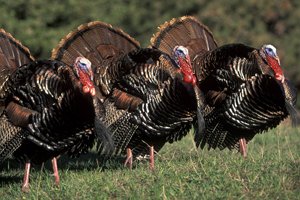
Some of the best hunting knowledge I ever gained was from a turkey that I didn’t kill. Perhaps the reason that I learned so much from this particular bird is the fact that I spent every single day of the 2006 spring turkey season trying to outdo him.
I first encountered the gobbler a couple of weeks before opening day when he gobbled off the roost in the early evening. Every evening after that, the gobbler would roost in the same tree. In the few days before the opener, I made trips to the farm before daylight to see if I could track the bird’s whereabouts once he flew from the roost. Each time, I noticed that he would fly down and immediately head down the creek bottom to the south.
“It was only a matter of time now,” I thought.
I was sure I’d be taking him for a ride on opening morning.
As luck would have it, I couldn’t hunt on opening morning due to work obligations, so I opted to give him a try that evening. That was a mistake.
I knew nothing about his evening habits other than where he liked to roost, so my plan of attack was simple: Set up close to his roost tree and wait for him to show up. This proved to be a bad idea. As I made my way to the roost tree that first afternoon, I bumped into him strutting in a thick, overgrown weed field. The jig was up and I got to watch the bird fly off.
I knew I wouldn’t be able to hunt him the following morning as well, but in a fit of ignorance, I decided to give him another try the next evening. I figured that this time I would fare better since I now knew where he would likely be hanging around in the afternoon.
The next afternoon, a scant distance from the truck on my way to the overgrown field, I again bumped into him and got to watch him fly off once a second time. This time, instead of being tucked down in the back corner of the field, he was at the very edge of it where he could easily see me begin my walk across the picked cornfield towards the overgrown field.
Had he been where he was the day before, I would have been okay, but that wasn’t the case this time, and to his advantage, there was simply no good way to approach the area he was in without running him off.
Well, after twice blowing my hunt, I headed back to the truck with a new plan; now knowing where he liked to hang out during the day, hunting him in the afternoons just wasn’t going to work.
No problem, I thought. There is still plenty of time left in the season. I’ll simply stick to hunting mornings and kill him then.
The problem was by then it was too late. From that point on, he changed his habits. On the next morning’s hunt, he wasn’t roosted anywhere near the area where he once felt comfortable. Now he was across the creek and a half-mile away.
To make matters worse, he wouldn’t even roost in the same spot twice after our initial encounter, making getting on him nearly impossible.
As the season wore on, my luck hunting him never improved. He refused to gobble and wouldn’t come to calls, thus making his presence unknown most of the time. But the existence of tracks proved that he was still around. I was committed to killing him.
In the final days of the season, I was admittedly tempted to hunt other farms I had at my disposal, ones I knew held turkeys. My odds of success at one of these other properties were sure to be better than trying to stick it out hunting this particular bird. But there was something about this hunt, it was the mere essence of hunting at its core, trying to figure out and outwit my quarry, that made me decide to stick out the season chasing this bird around.
In the end, I never did get the chance to level my sights on this elusive gobbler. But what I did have was the opportunity to learn. I was reminded once again that the key to being successful in hunting is not always just going out and hunting. Rather, a large part of hunting is to first observe your quarry to learn its habits before heading out into the field. This is important to remember even when the season is already open. I felt like I had him pegged during the mornings, but in the evenings, all I knew was where he was roosting and nothing else.
I was also reminded during that unsuccessful season that striking out isn’t bad and that you don’t get hurt by it. Although I may not have made the best decisions in order to put that bird on the ground, I still gave it my best while hunting him.
Finally, I learned what I was made of. Knowing I had easier birds to hunt in other areas, I opted to stick with hunting that one bird even though I knew my odds were slim. I knew it would have meant a lot more to me to kill that bird than any of the other birds I may have had a chance at, so I stuck it out. If I wouldn’t have, I probably would not have learned something new and I wouldn’t be writing this article.


 Edited
Edited